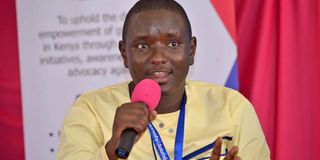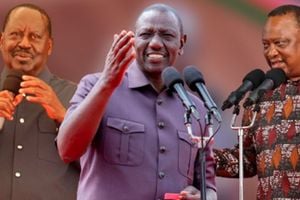Man on a mission to end FGM

Tony Mwebia is the founder of Men End FGM Foundation, an organisation that started off as an online campaign seven years ago, to fight FGM.
What you need to know:
- Tony Mwebia, a social worker by training is right at the frontline of fighting FGM.
- The gender equality advocate says the experiences of the refugees including men and women on how they had lost loved ones, inspired him to focus on the war on FGM.
- In 2013, Mr Mwebia started an online campaign dubbed #MenEndFGM to sensitise civil society organisations on the need to involve men in eradication of FGM.
- Out of his campaign, various organisations including the United Nations and the government have reviewed their policy to involve men in the fight against FGM.
The war on Female Genital Mutilation (FGM) is always seen as a women’s struggle but 33-year-old Tony Mwebia is right at the frontline.
A social worker by training, Mr Mwebia hails from Kinoro, Imenti South in Meru County where FGM was unheard of.
Until 2011, when he graduated from the University of Nairobi, he knew little about the vice but today, he is the founder of Men End FGM Foundation that started off as an online campaign seven years ago.
Mr Mwebia says while volunteering with HIAS Refugee Trust, an organisation that gives humanitarian aid to refugees, in 2013, he was engaged in a programme to sensitise refugees in Nairobi on the anti-FGM Act.
Equality advocate
“I had to read extensively about FGM, its impact and the laws around the vice. We went around Nairobi meeting refugees and sensitising them on the new law and the effects of FGM. In Eastleigh, I met Somali men who had harrowing tales of the challenges they have encountered since their wives had undergone the cut,” Mr Mwebia recounts.
The gender equality advocate says the experiences of the refugees including men and women on how they had lost loved ones, inspired him to focus on the war on FGM.
“One man recounted to us how while on their way from Dadaab refugee camp, his wife went on labour and since they had no access to a hospital, she bled to death. He also lost the baby the following day. I realised that men also had a role to play in eradication of FGM,” he says.
#MenEndFGM
In 2013, Mr Mwebia started an online campaign dubbed #MenEndFGM to sensitise civil society organisations on the need to involve men in eradication of FGM.
He says by that time; NGOs were using women only as champions against FGM yet men can bring the much needed impetus to the war.
“Men also have a story to tell on the problems of FGM. The silence of men is the worst undoing to the war on this vice,” he says.
Mr Mwebia says the online campaign grew into an offline movement in 2016, before becoming a registered organisation in 2019.
“Our focus is to form a movement of men and boys who will share their experiences and fight FGM. If the young generation of men say no to FGM, it will come to an end,” says the CEO.

Men End FGM Foundation founder Tony Mwebia during a training of anti-FGM champions in Meru last month. He is training men champions to take part in the war against FGM.
Out of his campaign, he says various organisations including the United Nations and the government have reviewed their policy to involve men in the fight against FGM.
In line with President Uhuru Kenyatta’s directive to end FGM in Kenya by 2022, Mr Mwebia has started training anti-FGM champions in 22 hotspot counties.
The foundation has already trained 20 champions in Igembe North, where female genital cutting is still rampant.
“We want to have at least 20 men champions in every county to amplify the voice against FGM. We are identifying influential men such as elders, teachers, activists and religious leaders who already have a platform to spread this message,” he explains.
Mr Mwebia says men have been slow in making their voices heard even as the vice goes underground and becomes medicalized in some parts of the country.
Father, daughter forums
Besides the war on FGM, Mr Mwebia is also fighting against sexual and gender-based violence through what he calls Father and Daughter Forums.
“In the Father and Daughter Forums, we want fathers to improve communication with their teenage daughters on matters menstrual hygiene, and reproductive health. Most girls cannot face their fathers to ask for sanitary towels and this has often contributed to teenage pregnancies in what is known as sex for pads,” Mr Mwebia explains.
Through his campaigns, Mr Mwebia has won various awards including the End FGM Social Media award by Anti-FGM Board in 2018, Silence Breakers Award in 2019, and was recognized as a national hero during the last year’s Mashujaa celebrations in Mombasa.
According to Unicef, four million girls and women have undergone FGM in Kenya.





